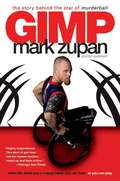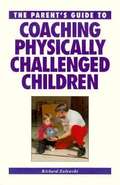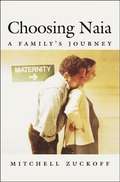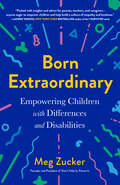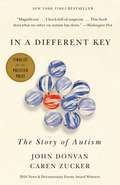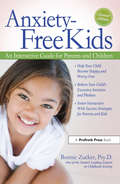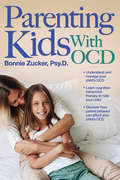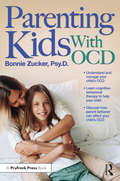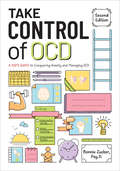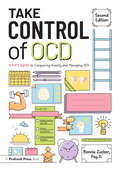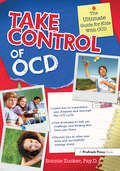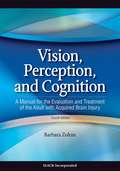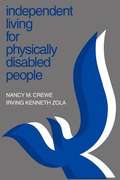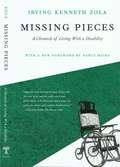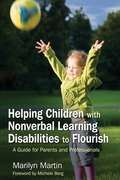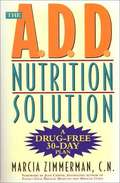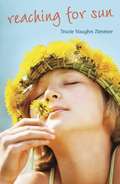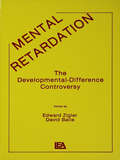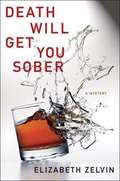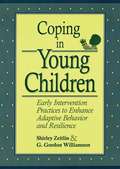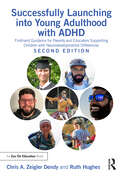- Table View
- List View
Gimp
by Mark Zupan Tim SwansonCollege soccer star Mark Zupan had been out drinking one night and had passed out in the back of his best friend's pickup truck when his friend got in the driver's seat, decided to take the truck for a spin, and accidentally crashed it. Thrown into a canal and stuck in frigid water for fourteen hours, Mark was finally rescued and learned soon after that he'd broken his neck. He'd most likely be a quadriplegic and spend the rest of his life in a wheelchair, doctors told him. At first Mark's only goal was to walk again. When that proved impossible, he fell into the depths of anger and despair, retreating from the world and the people closest to him. But love, friendship, and a new sport, quad rugby (a.k.a. "murderball"), helped Mark create a new existence that's truly exceptional. Gimp, the no-holds-barred memoir of a Paralympic athlete and the star of the Academy Award-nominated documentary Murderball, is an inspiring, defiant, and revealing celebration of spirit and will that confounds readers' prejudices by offering proof that a guy in a chair can still do amazing things: have sex with his girlfriend, party with his friends . . . even crowd-surf at Pearl Jam shows.
The Parents Guide to Coaching Physically Challenged Children
by Richard ZulewskiHandbooks in The Better Way Coaching Kids series serve as the perfect step-by-step introductory primers for parents and coaches. Written in an easy, conversational style, these books cover all the basic skill-building techniques, rules of the games, proper equipment and first aid. These guides focus on team spirit, the importance of fair play and overall fun. Special attention is paid to developing a child's confidence and self-esteem, -- all important keys to success.
Choosing Naia: A Family's Journey
by Mitchell ZuckoffChoosing Naia is a powerful story, based on an award-winning series of articles about a modern family and their Down syndrome baby. A dramatic and carefully detailed account of one family's journey through the maze of genetic counseling, medical technology, and disability rights
Born Extraordinary: Empowering Children with Differences and Disabilities
by Meg ZuckerA parent&’s guide to empowering children to embrace their visible and invisible differences Meg Zucker was born with one finger on each hand, shortened forearms, and one toe on each misshapen foot, caused by a genetic condition called ectrodactyly. She would eventually pass this condition on to her two sons, and, along with her husband, raise them and their adopted daughter, who has her own invisible differences. Born of the family&’s hard-won experiences, this book offers invaluable advice on raising confident, empathetic, and resilient children who succeed, not despite but because of their differences. Born Extraordinary helps parents of children with differences and disabilities to relinquish their instinctive anxieties, embrace their new normal, and ultimately find joy in watching their children thrive. Often the subjects of unwanted attention—ranging from pitying stares to bullying—Zucker and her sons have learned to ignore what others think and live fearlessly. Also incorporating the stories of other families with visible and invisible differences of all kinds, Born Extraordinary gives parents the tools to meet their children&’s emotional needs while supporting the whole family unit. Parents learn how best to empower their children to confront others&’ assumptions, grow in confidence, and encourage dialogue—rather than silence, fear, and shame—around difference.
In a Different Key
by Caren Zucker John DonvanNearly seventy-five years ago, Donald Triplett of Forest, Mississippi became the first child diagnosed with autism. Beginning with his family's odyssey, In a Different Key tells the extraordinary story of this often misunderstood condition, and of the civil rights battles waged by the families of those who have it. Unfolding over decades, it is a beautifully rendered history of ordinary people determined to secure a place in the world for those with autism--by liberating children from dank institutions, campaigning for their right to go to school, challenging expert opinion on what it means to have autism, and persuading society to accept those who are different. It is the story of women like Ruth Sullivan, who rebelled against a medical establishment that blamed cold and rejecting "refrigerator mothers" for causing autism; and of fathers who pushed scientists to dig harder for treatments. Many others played starring roles too: doctors like Leo Kanner, who pioneered our understanding of autism; lawyers like Tom Gilhool, who took the families' battle for education to the courtroom; scientists who sparred over how to treat autism; and those with autism, like Temple Grandin, Alex Plank, and Ari Ne'eman, who explained their inner worlds and championed the philosophy of neurodiversity. This is also a story of fierce controversies--from the question of whether there is truly an autism "epidemic," and whether vaccines played a part in it; to scandals involving "facilitated communication," one of many treatments that have proved to be blind alleys; to stark disagreements about whether scientists should pursue a cure for autism. There are dark turns too: we learn about experimenters feeding LSD to children with autism, or shocking them with electricity to change their behavior; and the authors reveal compelling evidence that Hans Asperger, discoverer of the syndrome named after him, participated in the Nazi program that consigned disabled children to death.By turns intimate and panoramic, In a Different Key takes us on a journey from an era when families were shamed and children were condemned to institutions to one in which a cadre of people with autism push not simply for inclusion, but for a new understanding of autism: as difference rather than disability.
In a Different Key: The Story of Autism
by Caren Zucker John DonvanAn extraordinary narrative history of autism: the riveting story of parents fighting for their children 's civil rights; of doctors struggling to define autism; of ingenuity, self-advocacy, and profound social changeNearly seventy-five years ago, Donald Triplett of Forest, Mississippi, became the first child diagnosed with autism. Beginning with his family's odyssey, In a Different Key tells the extraordinary story of this often misunderstood condition, and of the civil rights battles waged by the families of those who have it. Unfolding over decades, it is a beautifully rendered history of ordinary people determined to secure a place in the world for those with autism--by liberating children from dank institutions, campaigning for their right to go to school, challenging expert opinion on what it means to have autism, and persuading society to accept those who are different. It is the story of women like Ruth Sullivan, who rebelled against a medical establishment that blamed cold and rejecting "refrigerator mothers" for causing autism; and of fathers who pushed scientists to dig harder for treatments. Many others played starring roles too: doctors like Leo Kanner, who pioneered our understanding of autism; lawyers like Tom Gilhool, who took the families' battle for education to the courtroom; scientists who sparred over how to treat autism; and those with autism, like Temple Grandin, Alex Plank, and Ari Ne'eman, who explained their inner worlds and championed the philosophy of neurodiversity. This is also a story of fierce controversies--from the question of whether there is truly an autism "epidemic," and whether vaccines played a part in it; to scandals involving "facilitated communication," one of many treatments that have proved to be blind alleys; to stark disagreements about whether scientists should pursue a cure for autism. There are dark turns too: we learn about experimenters feeding LSD to children with autism, or shocking them with electricity to change their behavior; and the authors reveal compelling evidence that Hans Asperger, discoverer of the syndrome named after him, participated in the Nazi program that consigned disabled children to death.By turns intimate and panoramic, In a Different Key takes us on a journey from an era when families were shamed and children were condemned to institutions to one in which a cadre of people with autism push not simply for inclusion, but for a new understanding of autism: as difference rather than disability.From the Hardcover edition.
In a Different Key: The Story of Autism
by Caren Zucker John DonvanAn extraordinary narrative history of autism: the riveting story of parents fighting for their children ’s civil rights; of doctors struggling to define autism; of ingenuity, self-advocacy, and profound social changeNearly seventy-five years ago, Donald Triplett of Forest, Mississippi, became the first child diagnosed with autism. Beginning with his family’s odyssey, In a Different Key tells the extraordinary story of this often misunderstood condition, and of the civil rights battles waged by the families of those who have it. Unfolding over decades, it is a beautifully rendered history of ordinary people determined to secure a place in the world for those with autism—by liberating children from dank institutions, campaigning for their right to go to school, challenging expert opinion on what it means to have autism, and persuading society to accept those who are different. It is the story of women like Ruth Sullivan, who rebelled against a medical establishment that blamed cold and rejecting “refrigerator mothers” for causing autism; and of fathers who pushed scientists to dig harder for treatments. Many others played starring roles too: doctors like Leo Kanner, who pioneered our understanding of autism; lawyers like Tom Gilhool, who took the families’ battle for education to the courtroom; scientists who sparred over how to treat autism; and those with autism, like Temple Grandin, Alex Plank, and Ari Ne’eman, who explained their inner worlds and championed the philosophy of neurodiversity. This is also a story of fierce controversies—from the question of whether there is truly an autism “epidemic,” and whether vaccines played a part in it; to scandals involving “facilitated communication,” one of many treatments that have proved to be blind alleys; to stark disagreements about whether scientists should pursue a cure for autism. There are dark turns too: we learn about experimenters feeding LSD to children with autism, or shocking them with electricity to change their behavior; and the authors reveal compelling evidence that Hans Asperger, discoverer of the syndrome named after him, participated in the Nazi program that consigned disabled children to death.By turns intimate and panoramic, In a Different Key takes us on a journey from an era when families were shamed and children were condemned to institutions to one in which a cadre of people with autism push not simply for inclusion, but for a new understanding of autism: as difference rather than disability.— Washington Post, Notable Non-fiction Books in 2016— WBUR, Best Books of 2016— Wall Street Journal, Best Books of the Year
In a Different Key: The Story of Autism
by Caren Zucker John DonvanAn extraordinary narrative history of autism: the riveting story of parents fighting for their children ’s civil rights; of doctors struggling to define autism; of ingenuity, self-advocacy, and profound social changeNearly seventy-five years ago, Donald Triplett of Forest, Mississippi, became the first child diagnosed with autism. Beginning with his family’s odyssey, In a Different Key tells the extraordinary story of this often misunderstood condition, and of the civil rights battles waged by the families of those who have it. Unfolding over decades, it is a beautifully rendered history of ordinary people determined to secure a place in the world for those with autism—by liberating children from dank institutions, campaigning for their right to go to school, challenging expert opinion on what it means to have autism, and persuading society to accept those who are different. It is the story of women like Ruth Sullivan, who rebelled against a medical establishment that blamed cold and rejecting “refrigerator mothers” for causing autism; and of fathers who pushed scientists to dig harder for treatments. Many others played starring roles too: doctors like Leo Kanner, who pioneered our understanding of autism; lawyers like Tom Gilhool, who took the families’ battle for education to the courtroom; scientists who sparred over how to treat autism; and those with autism, like Temple Grandin, Alex Plank, and Ari Ne’eman, who explained their inner worlds and championed the philosophy of neurodiversity. This is also a story of fierce controversies—from the question of whether there is truly an autism “epidemic,” and whether vaccines played a part in it; to scandals involving “facilitated communication,” one of many treatments that have proved to be blind alleys; to stark disagreements about whether scientists should pursue a cure for autism. There are dark turns too: we learn about experimenters feeding LSD to children with autism, or shocking them with electricity to change their behavior; and the authors reveal compelling evidence that Hans Asperger, discoverer of the syndrome named after him, participated in the Nazi program that consigned disabled children to death.By turns intimate and panoramic, In a Different Key takes us on a journey from an era when families were shamed and children were condemned to institutions to one in which a cadre of people with autism push not simply for inclusion, but for a new understanding of autism: as difference rather than disability.
In a Different Key: The Story of Autism
by Caren Zucker John DonvanAn extraordinary narrative history of autism: the riveting story of parents fighting for their children ’s civil rights; of doctors struggling to define autism; of ingenuity, self-advocacy, and profound social changeNearly seventy-five years ago, Donald Triplett of Forest, Mississippi, became the first child diagnosed with autism. Beginning with his family’s odyssey, In a Different Key tells the extraordinary story of this often misunderstood condition, and of the civil rights battles waged by the families of those who have it. Unfolding over decades, it is a beautifully rendered history of ordinary people determined to secure a place in the world for those with autism—by liberating children from dank institutions, campaigning for their right to go to school, challenging expert opinion on what it means to have autism, and persuading society to accept those who are different. It is the story of women like Ruth Sullivan, who rebelled against a medical establishment that blamed cold and rejecting “refrigerator mothers” for causing autism; and of fathers who pushed scientists to dig harder for treatments. Many others played starring roles too: doctors like Leo Kanner, who pioneered our understanding of autism; lawyers like Tom Gilhool, who took the families’ battle for education to the courtroom; scientists who sparred over how to treat autism; and those with autism, like Temple Grandin, Alex Plank, and Ari Ne’eman, who explained their inner worlds and championed the philosophy of neurodiversity. This is also a story of fierce controversies—from the question of whether there is truly an autism “epidemic,” and whether vaccines played a part in it; to scandals involving “facilitated communication,” one of many treatments that have proved to be blind alleys; to stark disagreements about whether scientists should pursue a cure for autism. There are dark turns too: we learn about experimenters feeding LSD to children with autism, or shocking them with electricity to change their behavior; and the authors reveal compelling evidence that Hans Asperger, discoverer of the syndrome named after him, participated in the Nazi program that consigned disabled children to death.By turns intimate and panoramic, In a Different Key takes us on a journey from an era when families were shamed and children were condemned to institutions to one in which a cadre of people with autism push not simply for inclusion, but for a new understanding of autism: as difference rather than disability.
Anxiety-Free Kids: An Interactive Guide for Parents and Children
by Bonnie ZuckerAnxiety-Free Kids (2nd ed.) offers parents strategies that help children become happy and worry-free, methods that relieve a child's excessive anxieties and phobias, and tools for fostering interaction and family-oriented solutions. Using a unique companion approach that offers two books in one—a practical, reader-friendly book for parents and a fun workbook for kids—this solutions-oriented guide utilizes the cognitive-behavioral approach to therapy and integrates the parent in the child's self-help process.Research has shown that if left untreated, children with anxiety disorders are at higher risk to perform poorly in school, to have less-developed social skills, and to be more vulnerable to substance abuse. Covering the six most commonly occurring anxiety disorders—generalized anxiety, separation anxiety, specific phobias, social phobias, panic disorder, and obsessive-compulsive disorder—this book gives kids and parents successful strategies for achieving relaxation, conquering worries, challenging faulty thinking patterns, developing positive self-talk, and facing one's fears.Educational Resource
Parenting Kids With OCD: A Guide to Understanding and Supporting Your Child With OCD
by Bonnie ZuckerParenting Kids With OCD provides parents with a comprehensive understanding of obsessive-compulsive disorder, its symptoms, types, and presentation in children and teens. The treatment of OCD is explained, and guidelines on how to both find appropriate help and best support one's child is provided. Family accommodation is the rule, not the exception, when it comes to childhood OCD; yet, higher accommodating is associated with a worsening of the child's symptoms and greater levels of familial stress. Parents who have awareness of how they can positively or negatively impact their child's OCD can benefit their child's outcome. Case examples are included to illustrate the child's experience with OCD and what effective treatment looks like. OCD worsens when there is increased stress for the child; therefore, stress management is an essential component for improvement. Parents will learn how to manage stress in themselves and encourage effective stress management for their children.
Parenting Kids With OCD: A Guide to Understanding and Supporting Your Child With OCD
by Bonnie ZuckerParenting Kids With OCD provides parents with a comprehensive understanding of obsessive-compulsive disorder, its symptoms, types, and presentation in children and teens. The treatment of OCD is explained, and guidelines on how to both find appropriate help and best support one's child are provided. Family accommodation is the rule, not the exception, when it comes to childhood OCD; yet, higher accommodating is associated with a worsening of the child's symptoms and greater levels of familial stress. Parents who have awareness of how they can positively or negatively impact their child's OCD can benefit their child's outcome. Case examples are included to illustrate the child's experience with OCD and what effective treatment looks like. OCD worsens when there is increased stress for the child; therefore, stress management is an essential component for improvement. Parents will learn how to manage stress in themselves and encourage effective stress management for their children.
Take Control of OCD: A Kid's Guide to Conquering Anxiety and Managing OCD (Take Control Ser. #0)
by Bonnie ZuckerTake Control of OCD: A Kid's Guide to Conquering Anxiety and Managing OCD is a must-have guide for kids and teens ages 10–16 with obsessive-compulsive disorder to help them take control and use their strengths to find success in school and in life. This fully updated second edition:Uses a cognitive-behavioral therapy and exposure/response prevention method to stress gradual exposure to obsessive thinking patterns.Provides a step-by-step ladder-based process to help readers conquer their fears and demolish their worries.Helps kids change their obsessive thoughts, tolerate uncertainty, and develop positive self-talk and stress management.Also helps kids advocate for their needs in school and build successful relaxation procedures.Includes workbook-style pages for readers to complete.From her extensive work with hundreds of young people with OCD, the author offers tons of advice, information, and ideas for kids and teens. Readers will find themselves in this book, as it normalizes and validates the often hidden and undisclosed thoughts, urges, and images, and accompanying rituals and compulsions that so many children and teens with OCD struggle with.
Take Control of OCD: A Kid's Guide to Conquering Anxiety and Managing OCD
by Bonnie ZuckerTake Control of OCD: A Kid's Guide to Conquering Anxiety and Managing OCD is a must-have guide for kids and teens ages 10-16 with Obsessive-Compulsive Disorder to help them take control and use their strengths to find success in school and in life. This fully updated second edition:Uses a cognitive-behavioral therapy and exposure/response prevention method to stress gradual exposure to obsessive thinking patterns.Provides a step-by-step ladder-based process to help readers conquer their fears and demolish their worries.Helps kids change their obsessive thoughts, tolerate uncertainty, and develop positive self-talk and stress management.Also helps kids advocate for their needs in school and build successful relaxation procedures.Includes workbook-style pages for readers to complete.By interviewing kids with OCD from across the country, the author offers tons of advice, information, and ideas for students, by students just like them. Readers will find themselves in this book, as it normalizes and validates the often hidden and undisclosed thoughts, urges, and images, and accompanying rituals and compulsions that so many children and teens with OCD struggle with.Ages 10-16
Take Control of OCD: The Ultimate Guide for Kids With OCD (Take Control Ser. #0)
by Bonnie ZuckerTake Control of OCD: The Ultimate Guide for Kids With OCD is a unique guide just for kids ages 10-16 with Obsessive-Compulsive Disorder to help them take control of their disorder and find success in school and in life. Using a cognitive-behavioral therapy method to stress gradual exposure to students' obsessive thinking patterns, the book takes kids step-by-step through a ladder-based process to conquer their fears and demolish their worries.Focusing on helping kids change their obsessive thoughts, tolerate uncertainty, develop positive self-talk and stress management, advocate for their needs in school, find successful relaxation procedures, and face their fears, the book includes workbook-style pages for kids to complete. By interviewing kids with OCD from across the country, the author offers tons of advice, information, and ideas for students, by students just like them. This handy guidebook is sure to help children with OCD change their behaviors and conquer their worries, discovering a sense of accomplishment and achievement.Ages 10-16
Vision, Perception, and Cognition: A Manual for the Evaluation and Treatment of the Adult with Acquired Brain Injury
by Barbara ZoltanVision Perception and Cognition, Fourth Edition is a concisely structured text that expertly addresses clinical reasoning and decision making for the entire evaluation and treatment process of the adult with acquired brain injury. Provided are theoretical information, guidelines for both static and dynamic assessment, information on specific standardized evaluations, guidelines for adaptive and restorative treatment based on described theoretical and evidence-based information, and information on environmental impact of client performance.
Independent Living for Physically Disabled People
by Irving Kenneth Zola Nancy M. CreweA text book for students in Rehabilitation Counseling classes.
Missing Pieces: A Chronicle of Living With a Disability
by Irving Kenneth Zolahe personal odyssey of a man with a disability, this passionate book tries to tell as well as analyze what it is like to have a disability in a world that values vigor and health. Zola writes, "Missing Pieces is an unraveling of a social problem in the manner of Black Like Me. Like its author, I, too, am a trained social observer, but for me 'passing' was not an issue. For I already have the stigmata of the disable - the braces, the limp, the cane - though I have spent much of my life denying their existence." The author started out in the role of a social scientist on a seven-day excursion to acquaint himself with an extraordinary experiment in living - Het Dorp, one of the few places in the world designed to promote "the optimum happiness" of those with severe physical disabilities. Neither a medial center nor a nursing home, Het Dorp is a village in the western-most part of the Netherlands. What began as a sociological attempt to describe this unusual setting became, through the author's growing awareness, what can only be called a socio-autobiography. Resuming his prior dependence on a wheelchair, the author experienced his own transformation from someone who is "normal" and "valid" to someone who is "invalid." The routine of Het Dorp became his: he lived in an architecturally modified home, visited the workshops, and shared meals, social events, conversation, and perceptions with the remarkably diverse residents. The author confronts some rarely discussed issues - the self-image of a person with a chronic disability, how one fills one's time, how one deals with authority and dependence, and love and sex. Missing Pieces offers striking insights into an aspect of the human condition shared by nearly 30 million Americans. It is must reading for the general reader, as well as for the rehabilitation counselor, social worker, or social scientist. Author note: Irving Kenneth Zola (1935-1994) was Professor of Sociology at Brandeis University and a founding member and counselor at the Boston Self-Help Center. Nancy Mairs is the author of seven books, including Waist-High in the World: A Life Among the Disabled, and most recently, A Troubled Guest: Life and Death Stories. She lives in Tucson with her husband, George.
Helping Children with Nonverbal Learning Disabilities to Flourish: A Guide for Parents and Professionals
by Marilyn Martin Zion`Imagine getting lost in your own home, forgetting where the bathroom is at work, or being unable to operate a simple door knob. These are just some of the myriad challenges faced by individuals with a Nonverbal Learning Disability, or NLD...In Helping Children With Non-Verbal Learning Disabilities to Flourish, Marilyn Martin gives an overview of NLD and strategies for teaching individuals with this disability. Using examples of her struggles to help her daughter, who has NLD, as well as current research, she has written a book helpful for both parents and professionals. In addition to her experiences with her daughter, Martin is a Learning Specialist with more than fifteen years of experience working with students who have dyslexia, NLD, and other learning disorders... This book is a good introduction to NLD and interventions for treating it... As it gains recognition as a distinct learning disorder, interventions and informative books, like this one, will open doors, literally and figuratively, for families and individuals touched by NLD.' - Foreword, Autumn 2007 `Author Marilyn Martin's daughter Sara was diagnosed with Nonverbal Learning Disability (NLD). Marilyn offers a comprehensive developmental profile of children with NLD and explores the controversies surrounding the condition so parents and professionals can identify learners with NLD and ensure they receive early intervention. Offering practical advice on NLD at home and at school, the book describes step by step interventions for improving a range of skills from penmanship to social acumen.' -Autism Us, 2007 `Marilyn Martin's book Helping Children with Nonverbal Learning Disorder to Flourish is an exciting and essential new addition to the literature. ... Martin shines in her ability to match interventions to a broad range of problems and examples abound in every chapter. Clear, concise, and detailed explanations are given so that the interventions can be applied skillfully. ... Each intervention is presented in a terrifically useful and usable format that includes the problem, strengths available, proposed solution, how the solution can be generalized, the goal of the intervention, and a very up-to-date and helpful listing of relevant resources.' - from the Foreword by Michele Berg, Director, Center for Learning Disorders, Family Service and Guidance When you continuously cannot find the bathroom in your best friend's house, or you cannot print the letter `t' when all your friends are writing volumes, you notice, and you ask questions. So it was for Marilyn Martin's daughter, Sara, who was diagnosed with Nonverbal Learning Disability (NLD). This book skilfully combines a comprehensive guide to NLD with the inspiring story of how Sara transformed herself from that young girl whose existence seemed darkened by learning difficulties into the capable young woman she is today. In Helping Children with Nonverbal Learning Disabilities to Flourish, Marilyn Martin presents a comprehensive developmental profile of children with NLD. She explores the controversies surrounding the disorder so parents and professionals can identify learners with NLD and insure they receive early intervention. Offering practical advice on NLD at home and at school, she describes step-by-step interventions for improving a range of skills from penmanship to social acumen. This book is essential reading for parents and professionals working with children with NLD.
The A. D. D. Nutrition Solution: A Drug-Free Thirty-Day Plan
by Marcia ZimmermanThe first scientifically proven, effective, all-natural nutritional alternative to the much-prescribed drug Ritalin. Attention deficit disorder is a nutritional deficiency, not a psychological condition. This is the revolutionary discovery Marcia Zimmerman made during her ten years of research as a nutritional biochemist. That conclusion led her to develop a diet that addresses the specific needs of the 17 million adults and children suffering from ADD. Her easy-to-follow thirty-day plan has been proven just as effective as Ritalin in relieving the symptoms of ADD. Learn: - How women should boost their nutrition before conception to prevent ADD in their children. - Why boys are much likelier to be tagged as ADD than girls - How to get a reliable ADD diagnosis Reasons why parents prefer a diet plan to prescription drugs for ADD children - The effects of brain allergies on attention span - Foods to avoid that may exacerbate ADD - Fats and oils we all need to stay focused - Calming effects of carbohydrates - Concentration-enhancing protein - Why to stay away from simple sugars - The dangers of artificial food ingredients, and much more This important book will help us curb the epidemic growth of ADD in this country and change the way we treat those who have it now by addressing its source instead of merely treating its symptoms.
Reaching for Sun
by Tracie Vaughn ZimmerJosie Wyatt knows what it means to be different. Her family's small farmhouse seems to shrink each time another mansion grows up behind it. She lives with her career-obsessed mom and opinionated Gran, but has never known her father. Then there's her cerebral palsy: even if Josie wants to forget that she was born with a disability, her mom can't seem to let it go. Yet when a strange new boy--Jordan--moves into one of the houses nearby, he seems oblivious to all the things that make Josie different. Before long, Josie finds herself reaching out for something she's never really known: a friend... and possibly more. Interlinked free verse poems tell the beautiful, heartfelt story of a girl, a family farm reduced to a garden, and a year of unforgettable growth.<P><P> Winner of the Schneider Family Book Award
Mental Retardation: The Developmental-difference Controversy
by Edward Zigler David BallaPublished in 1983, Mental Retardation is a valuable contribution to the field of Education.
Death Will Get You Sober
by Elizabeth ZelvinOn Christmas Day, Bruce Kohler wakes up in detox on the Bowery in New York City. He knows it's time to change his life, but how can he stay sober without dying of boredom? When homeless alcoholics start to die unexpectedly, Bruce is surprised to find he cares enough to want to find out why. Most of them had been down and out for many years, but Bruce's friend Guff was different: a cynical aristocrat with a trust fund and some secrets. Two old friends give Bruce a second chance and agree to help him with his investigation: his best friend, Jimmy, a computer genius and history buff who's been in AA for years, and Jimmy's girlfriend Barbara, a counselor who sometimes crosses the line between helping and codependency. Barbara works a night shift at the detox and confronts a counselor who might still be dealing drugs. Bruce gets a job temping for Guff's arrogant nephew. Between the three of them, suspects start piling up. The trail leads back to the detox. Or does it? In Death Will Get You Sober, Bruce discovers that the church basements of AA are a small world in the big city of New York.As he grapples with staying sober, he finds that not drinking is only the beginning of coming back to life--a life he finds he wants to keep when it's threatened by a killer. Debut author Elizabeth Zelvin has used her expertise as an addiction councilor to pen a riveting mystery filled with memorable, realistic characters who are as flawed as they are heroic.
Coping in Young Children: Early Intervention Practices to Enhance Adaptive Behavior and Resilience
by Shirley Zeitlin G. Gordon WilliamsonA guide for early intervention professionals describing the ways to assist children with disabilities to integrate and apply their developmental skills for greater flexibility and independent problem solving. Covers application of a theoretical frame of reference, assessment of children's coping styles, and collaborating with parents to facilitate adaptive functioning. Includes case histories and sample forms. Annotation copyright by Book News, Inc. , Portland, OR
Successfully Launching into Young Adulthood with ADHD: Firsthand Guidance for Parents and Educators Supporting Children with Neurodevelopmental Differences
by Chris A. Zeigler Dendy Ruth HughesThis new edition of Successfully Launching into Young Adulthood with ADHD provides firsthand guidance for both parents and professionals to help teens prepare for a bright future after high school. The advice and strategies outlined in this book are evidence based and provide much-needed guidance to parents and the professionals who educate, coach and treat these students. This guidance will ensure that teens are ready to meet upcoming challenges and demands after high school graduation. With an always hopeful and personable message, the authors share their own and other parents’ insights on avoiding common missteps, the perils of a premature launch to college and finding what works for their unique child. Updated chapters include a discussion around medications and new information on gap year programs, and college accommodations. This top-notch guide is essential reading for any parent raising a young adult with ADHD and for the professionals who work with them.
